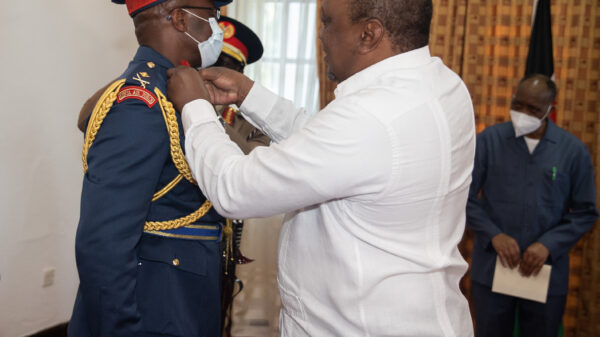Following in the tradition of Chinese foreign ministers starting every new year with a visit to Africa, State Councilor and Foreign Minister Wang Yi will visit Eritrea, Kenya and the Comoros from January 4 to 7, 2022 upon invitation by the respective hosts. This will be the 32nd annual visit to the continent.
Making the announcement on December 2, 2021 Zhao Lijian, spokesperson for the Chinese Foreign Ministry noted that this customary visit “demonstrates the great importance China attaches to its traditional friendship with Africa and the development of China-Africa relations.”
For Sino-Africa experts and watchers alike, this is one of the most important annual highlights and sets the tone of how the partners will react to geopolitical issues going forward. It is also a barometer of how the two have reacted to external pressure bent on putting a spanner in their socio-economic and even political works.
That China and Africa have formed a close bond in a long running relationship spanning more than five decades is not in doubt. Currently, China has established diplomatic relations with 53 African countries, in addition to 160 pairings with sister provinces or cities between the two partners. This shows the depth of cooperation and closeness that has progressively developed over time.
China has established 61 Confucius Institutes and 48 Confucius Classrooms in Africa. Language is a crucial channel in creating mutual understanding, which informs the establishment of these basic language and cultural centers. It is also added value for Africans who, with the addition of Mandarin to their lingua franca and foreign second languages, are becoming truly global citizens through multilingualism. But it is expected that with Sino-Africa relations becoming widespread in Africa, Mandarin will replace most foreign languages in the continent in a span of less than 50 years.
China’s COVID-19 assistance to Africa is well documented. Recently, President Xi Jinping announced that China will provide another one billion doses of COVID vaccines to Africa, including 600 million doses as a donation, to help the countries achieve the goal set by the African Union of vaccinating 60 percent of the African population by 2022. Africa will also benefit immensely from China’s COVID-19 assistance to developing countries bilaterally, and even through multilateral channels like the COVAX Facility.
During the eighth ministerial conference of the Forum for China-Africa Cooperation (FOCAC) held in Dakar, Senegal in November, 2021 China pledged to permit $300 billion worth ofAfrican imports in the next three years. It also promised $10 billion in trade finance to support African exports. Chinese businesses will also invest at least $10 billion in Africa over the next three years, and offer $10 billion worth of credit facilities to African financial institutions.
In a great gesture of genuine friendship, China said it is ready to channel $10 billion to African countries from China’s share of the International Monetary Fund’s new allocation of special drawing rights. To cap it all on this front, Chinese companies in Africa plan to create not less than 800,000 local jobs.
The year 2021 marked the 65th anniversary of the start of diplomatic relations between China and African countries. Almost by design, Agenda 2063’s flagship projects reflect FOCAC’s pillars. These are wide ranging sectors in the areas of infrastructure, science and technology, education as well as arts and culture. Specifically, Sino-Africa cooperation has experienced either the conception, emergence or realization of some major initiatives, some of these together with other African partners.
These include the ten major cooperation programs envisioned by President Xi during the FOCAC Johannesburg Summit in December 2015 – agricultural modernization, infrastructure, finance, green development, trade and investment facilitation, poverty reduction, public health, cultural and people-to-people exchanges, and peace and security.
Over the past two decades, Chinese overseas Foreign Direct Investment to Africa has grown, from $75 million in 2003 to $ 5.4 billion in 2018. Through the Belt and Road Initiative (BRI), China has
also expanded its sphere of influence in Africa, and specifically through investment in infrastructure development such as industrial parks, railway, ports, and roads among others.
During the launch of a report in Nairobi titled “Shared Prosperity: Tracking the Belt and Road Initiative in Kenya, 2018-2021” held in November, President and Chief Executive of the Africa Policy Institute, Prof Peter Kagwanja, observed that the centuries-old reservoir of collective wisdom and philosophy carries the values of cooperation and solidarity between China and Africa as two old civilizations with a long history of friendly interactions and mutual cooperation.
“Today, FOCAC and BRI form the twin-engines of the Sino–Africa architecture now propelling Africa’s development. China has committed at least $200 billion to lift Africa from poverty and underdevelopment. After BRI was launched, China has extended a $120 billion dollar lifeline, $60 billion in 2015 and another $60 billion in 2018. This is the largest bailout in human history, and the first ever by a developing nation like China,” observed Prof Kagwanja.
As noted during FOCAC, China has become an indispensable partner in Africa’s development, and the forum has now become the most important accelerator for Sino-Africa cooperation. Africa supports and will actively participate in the Global Development Initiative and the Initiative on Partnership for Africa’s Development, both of which are Chinese led initiatives.Further, Africa expects greater support from China for herindustrialisation and fight against the pandemic. Africa stands ready to contribute to high-quality Belt and Road cooperation for people’s well-being and common prosperity.
[Stephen Ndegwa is a Nairobi-based communication expert, lecturer-scholar at the United States International University-Africa, author and international affairs columnist]























































